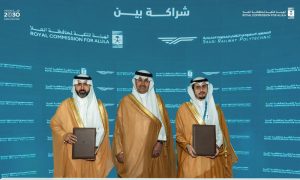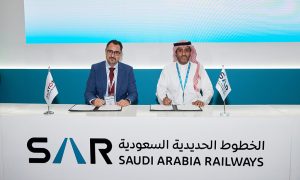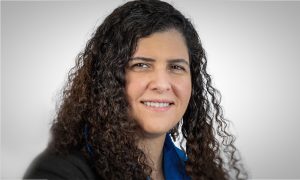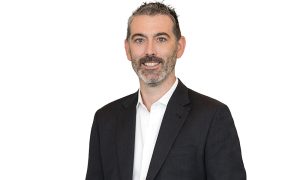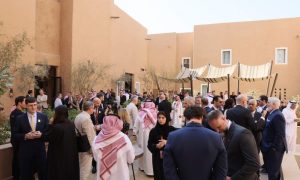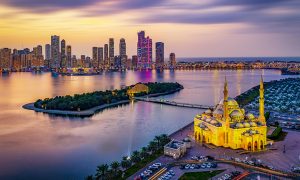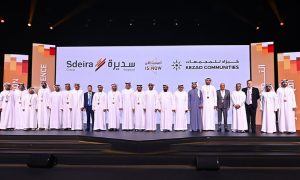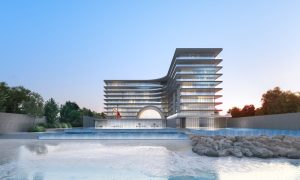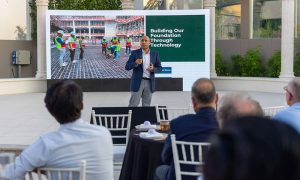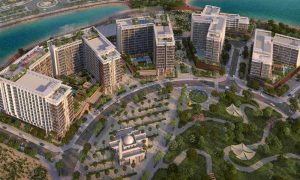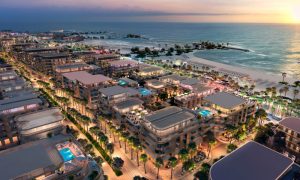George Berbari airs strong views on HVAC
DC Pro boss wants to change perceptions of district energy and green MEP

It only takes a few minutes of conversation with George Berbari, CEO of DC Pro Engineering, to learn that he is a man of strong opinions that he’s not afraid to air. Having spent more than 30 years in the HVAC industry, 25 of them in the GCC, he’s probably more entitled than most to speak his mind.
A Lebanese citizen, Berbari was part of the team that set up regional district cooling giant Tabreed. Having established himself as one of the foremost experts in the field of district energy, he is now focused on turning DC Pro into a regional authority and leader in the fields of district energy and green building MEP design.
“It’s our tenth year now. DC Pro has led the Middle East in developing the district cooling and the green MEP movement. We are one of very few businesses with a mission to evolve the industry, rather than focusing purely on profit, loss and growth. Which is important for every company of course, but we’ve taken a stand of long-term engagement with the market. We want to lead the market, not be led by the market,” he tells Big Project ME during an interview at his offices in Sharjah.
“We’ve always managed to set trends in the Middle East, and to do that you have to have a passion for your business and a love for people and society. It’s almost like volunteering work, what we do. Because you know that these efforts are not being compensated financially, but it’s what I see as a social responsibility for companies.”
READ MORE: Qatar ‘may not require cooling systems at winter World Cup’
READ MORE: Gulf’s ‘stagnating’ district-cooling sector must evolve or die, expert says
READ MORE: HVAC sector warms up
Having now established DC Pro Engineering as a force in the market, Berbari’s next challenge is to continue pushing his company, and by extension the industry, forward. In March of this year, during the third Annual District Cooling Stakeholders Summit at the Dusit Thani Hotel in Dubai, he gave a presentation on ‘The Threat of Technology Stagnation on District Cooling’.
This is a particular bugbear for him, and he admits that changing perceptions and preconceived notions can be a bit frustrating. “I have a role in guiding this industry, and I’m saying ‘wake up’. This is not the place where we have to be, to stagnate with something that’s 10 years old and not be really sustainable, and that’s especially when there are smaller, alternative systems that are either as efficient as or more efficient than district cooling in its current status. We either have to evolve, or die.”
That sentiment is prevalent in his presentation, which explains how synchronisation of district cooling tri-generation with renewable energy sources can result in 75% savings in primary energy, compared to electric-powered district cooling. District cooling systems already offer a 40% saving on power consumption compared to air-cooled systems, which is why there are now more than five million tonnes of district cooling systems installed in the GCC.
“What we’re promoting is a model of trigeneration that has a distribution centre that is much closer to the city centre, and where heavy recovery is transferred into cooling energy mostly, while some is used for hot water. We found that this model saves up to 75% of primary energy compared to district cooling. When we adopted district cooling, it was saving 40% of energy compared to HVAC. So now, if you find technology that saves more energy, why isn’t it being adopted?
“In 2011, Dubai had reached a 20% penetration rate for district cooling. UAE in general was at 11%. Dubai is putting forward a target of 40% penetration by 2020 or 2030. Normally, they would achieve that. Abu Dhabi is also targeting about 30% penetration. However, my message to them is that the current technology is offering very little to the green building movement. It should be evolving to a place where it is tri-generation, plus renewables. Then we’re offering something really substantial.”
READ MORE: Qatar ‘may not require cooling systems at winter World Cup’
READ MORE: Gulf’s ‘stagnating’ district-cooling sector must evolve or die, expert says
READ MORE: HVAC sector warms up
With the UAE committed to 7% of its energy use being provided by renewable energy by 2020, the move towards tri-generation would certainly be a step in the right direction. However, it’s the wider GCC that Berbari sees as a bigger challenge.
“Saudi Arabia is a bit more challenging, because they’ve fragmented the decision-making into several areas. You have the King Abdullah City for Renewable and Atomic Energy that deals solely with renewables. Then you have the Saudi Energy Efficiency Council that deals solely with equipment deficiencies and works in consensus with equipment suppliers and manufacturers, and you also have the Saudi Electric Company that tries to impose insulation on all new buildings, otherwise you don’t get the connection to power,” he explains.
“As human beings, we struggle with the right of free ownership and when the state should interfere. I’m writing a book about how to get that right – between the stick and the carrot. If you’re inefficient in your house, I can’t force you, as a private owner, to do insulation. But what can I do? Instead of putting a slab rate on consumption, which is very wasteful in the GCC, especially in Dubai and Saudi Arabia.
“What we want to do is put slab rates per square metre. So therefore, if you’re efficient, then you’ll benefit from low slab rates. If you’re inefficient, then you are penalised by much higher rates. These penalties then don’t go to the utility companies. Instead they go to the municipalities, where they will be used as funds. For example, if you want to insulate your house, then the municipality will give you 50% of your costs, so that’s the carrot and the stick.”
Berbari also outlines some of the challenges cropping up during construction for the 2022 World Cup stadiums in Qatar. With tenders for the projects released, the district cooling expert in him flinches when he talks about these projects.
“Now the tenders have been released, and the energy centres that are feeding these tenders are as big as 87,000 tonnes. We saw the design, and we addressed it with the Aspire Committee. We showed them an alternative that could save much more energy. The current design is using as much land as the stadium, probably. It was costing too much and was too inefficient. We put forward an alternative proposal, where we could save land and about 30% of energy, and have a much more effective design. I did this study without any request from anybody. It takes that kind of initiative from people. When they called us, I had it ready. Their first impression was ‘can we improve it by that much?’ They were interested; who doesn’t want to reduce construction costs by half and improve efficiency at the same time?”
DC Pro Engineering has a reputation as the go-to company for complicated projects, and this attitude reflects Berbari’s willingness to share and spread information throughout the regional construction industry.
READ MORE: Qatar ‘may not require cooling systems at winter World Cup’
READ MORE: Gulf’s ‘stagnating’ district-cooling sector must evolve or die, expert says
READ MORE: HVAC sector warms up
Dubai and its neighbours in the GCC are the most active constructive market on the globe. Therefore, it’s only natural that there has been an influx of construction consultants and contractors setting up shop in the Gulf. Despite the recovery of the market from the slump in 2009, there are still concerns about whether there are more companies than projects, as Berbari puts it.
“What makes it more challenging is that every single construction company in the world wants to come to Dubai, to the UAE, to Qatar. What I always advise consultancies is to never rely on a single city. You see consultancies that relied on Abu Dhabi or Dubai and ignored the rest of the region. This is a risky strategy. The more you diversify into the region and beyond, the better for you. This is especially true when Dubai is a major service centre to Africa. DC Pro works extensively in Africa, we also work in Singapore, the US, Australia and Canada – we have several offices worldwide.
“Contractors need to have boots on the ground, but consultants can engage with local companies and be an engineer of record, so it’s very easy to expand. Singapore has managed to distinguish itself, much like Hong Kong, as an engineering centre for the Asia Pacific region. I think Dubai should follow suit. This is my take on the market. People and companies who are only based in Dubai, they will choke.”
This isn’t just empty talk either, as the CEO has ensured that his firm practises what he preaches. A year ago, Berbari signed off on a joint venture agreement with the Greek consultancy Ergon EMA. Created in 2011 through the merger of six Greek consultancies, the firm provides interdisciplinary services around the world.
“We’re now bidding and have won several projects together. This is a way to help DC Pro keep its focus on MEP, but also to get us engaged in architecture as well. Even though we started on big MEP projects fairly early on in the company’s history, we found that we could not grow our MEP sector to the level that we wanted to. One reason for that was because there were several important architects who had in-house MEP departments or had associations with MEP organisations.
“Therefore, it was difficult for us to penetrate into the market from an architectural point of view. This led to a change in our vision, and so we added architectural engineering services so as to have a larger market share of MEP,” he explains. This approach appears to be bearing dividends, with a successful 2014 seeing the consultancy of 50 employees achieve record turnover of $5.71 million in engineering fees alone. This translates into more than $272 million worth of projects handled in just a year’s time.
Despite this, Berbari says he’s not entirely happy with how 2014 went. When he and his management team examined the year in detail, he found that there was a discrepancy with projects, with some having lost a large amount of money, while others actually made money. As a result, he vows that this year he will be monitoring projects closely to try and minimise losses and improve his company’s efficiencies, which in turn will improve its profitability.
“When we work for contractors, we find that they are owned by consultants and owners. We are at the bottom of the food chain. So we have a lot of aborted work, and a lot of unpaid aborted work, when we work for contractors, unfortunately. We find that contractors squeeze you a lot in terms of engineering fees, and ask you to work double or triple [the amount you normally would].
“So we’re trying to avoid working for contractors and are instead focusing on working for end users and customers, where, if you meet what they want, your changes will be minimal. What we’ve seen is that companies who are not professional are getting out of the game. So my advice is for companies to do their due diligence with their business models – look at how they price projects, how they control costs – whether it’s in the engineering sector or the construction sector. It’s crucial today that people put plans in place,” Berbari warns.
READ MORE: Qatar ‘may not require cooling systems at winter World Cup’
READ MORE: Gulf’s ‘stagnating’ district-cooling sector must evolve or die, expert says
READ MORE: HVAC sector warms up
